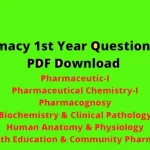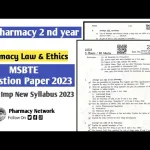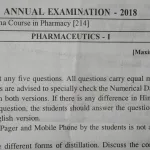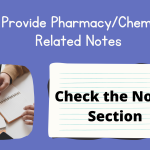D Pharmacy 1st year covers fundamental subjects like pharmaceutics, pharmaceutical chemistry, pharmacognosy, and biochemistry. Solving previous question papers helps students grasp concepts effectively. Below is a compilation of solved questions from the 2023 question papers for all D Pharmacy 1st-year subjects, prepared to support thorough understanding and exam preparation.
Pharmaceutics
Question What is the role of excipients in pharmaceutical formulations?
Answer Excipients are inactive substances used as carriers for the active ingredients of a medication. They help in drug stability, absorption, and delivery.
Question Define pharmacopoeia.
Answer A pharmacopoeia is an official book containing a list of medicinal drugs with their descriptions, formulas, and preparation standards.
Question Explain the term emulsions in pharmaceutics.
Answer Emulsions are mixtures of two immiscible liquids, usually oil and water, stabilized by an emulsifying agent.
Question What is the difference between tablets and capsules?
Answer Tablets are solid dosage forms compressed into shapes, while capsules are gelatin shells filled with powder or liquid drugs.
Question What is sterilization in pharmaceuticals?
Answer Sterilization is the process of eliminating all microorganisms from pharmaceutical preparations to ensure safety.
Question Name the various routes of drug administration.
Answer Routes of drug administration include oral, intravenous, intramuscular, subcutaneous, and topical.
Question Explain the importance of dissolution testing.
Answer Dissolution testing evaluates the rate and extent of drug release from a dosage form, ensuring its efficacy.
Question Define bioavailability in pharmaceutics.
Answer Bioavailability refers to the fraction of an administered drug that reaches systemic circulation in its active form.
Question What are syrups in pharmaceutical preparations?
Answer Syrups are concentrated aqueous solutions of sugar containing medicinal substances for oral use.
Question Mention the uses of ointments.
Answer Ointments are semi-solid preparations applied externally for local effects such as skin protection or treatment.
Pharmaceutical Chemistry
Question What are the differences between organic and inorganic compounds?
Answer Organic compounds contain carbon and hydrogen, whereas inorganic compounds generally do not.
Question Define isomerism in chemistry.
Answer Isomerism is a phenomenon where compounds have the same molecular formula but different structures.
Question What is the role of buffers in pharmaceutical preparations?
Answer Buffers maintain the pH stability of solutions to ensure drug effectiveness and stability.
Question Explain the concept of mole in chemistry.
Answer A mole represents 6.022 × 10²³ particles of a substance, equivalent to its molecular or atomic weight in grams.
Question What is a catalyst?
Answer A catalyst is a substance that speeds up a chemical reaction without being consumed in the process.
Question Mention the uses of sodium bicarbonate in medicines.
Answer Sodium bicarbonate is used as an antacid to treat heartburn and indigestion.
Question Define functional groups in organic chemistry.
Answer Functional groups are specific groups of atoms within molecules that are responsible for the chemical reactions of those molecules.
Question What are antioxidants in pharmaceuticals?
Answer Antioxidants prevent oxidation, protecting drugs and formulations from degradation.
Question Explain the term pharmacokinetics.
Answer Pharmacokinetics studies how drugs are absorbed, distributed, metabolized, and excreted in the body.
Question What is the significance of pH in drug formulation?
Answer pH affects the solubility and stability of drugs, influencing their absorption and efficacy.
Pharmacognosy
Question Define pharmacognosy.
Answer Pharmacognosy is the study of drugs derived from natural sources like plants, animals, and minerals.
Question What are alkaloids?
Answer Alkaloids are naturally occurring organic compounds that have pharmacological effects, often used in medicines.
Question Name a few medicinal plants and their uses.
Answer Neem (antibacterial), Tulsi (anti-inflammatory), and Aloe Vera (skin treatment).
Question What is crude drug?
Answer Crude drugs are unprocessed natural substances used in pharmaceuticals, like roots, leaves, or flowers.
Question Explain the term maceration.
Answer Maceration is a process of extracting plant extracts by soaking in a solvent over time.
Question What are glycosides?
Answer Glycosides are organic compounds in plants that release sugar and medicinally active substances upon hydrolysis.
Question Define tannins.
Answer Tannins are polyphenolic compounds in plants used for their astringent and antimicrobial properties.
Question What are volatile oils?
Answer Volatile oils are aromatic oils extracted from plants, used in aromatherapy and medicines.
Question Explain the term secondary metabolites.
Answer Secondary metabolites are organic compounds not directly involved in normal growth, but they often have medicinal properties.
Question What is the significance of standardization in pharmacognosy?
Answer Standardization ensures the quality, purity, and consistency of natural drugs.
Biochemistry
Question What are carbohydrates?
Answer Carbohydrates are organic compounds that provide energy, made up of carbon, hydrogen, and oxygen.
Question Define enzymes.
Answer Enzymes are biological catalysts that speed up chemical reactions in the body.
Question What is the role of proteins in the body?
Answer Proteins are essential for tissue repair, enzyme production, and muscle building.
Question Explain the concept of metabolism.
Answer Metabolism refers to the chemical processes in the body that convert food into energy.
Question What is the significance of vitamins?
Answer Vitamins are organic compounds necessary for proper growth and body functions.
Question What is the function of hemoglobin?
Answer Hemoglobin carries oxygen from the lungs to tissues and returns carbon dioxide to the lungs for exhalation.
Question Define nucleic acids.
Answer Nucleic acids, like DNA and RNA, store and transmit genetic information.
Question What is the difference between fats and oils?
Answer Fats are solid at room temperature, while oils are liquid due to differences in their fatty acid composition.
Question Mention the role of minerals in the body.
Answer Minerals are essential for bone health, nerve function, and enzyme activation.
Question Explain glycolysis.
Answer Glycolysis is the metabolic pathway that breaks down glucose to produce energy in the form of ATP.
Proper practice of these solved questions helps students understand the core concepts and ace their exams confidently. Focused study of each subject improves overall performance and foundational knowledge.
Latest Posts
- Step-by-step guide to download and apply for jee mains admit card 202
- Comprehensive 2025 government holidays and recruitment details for job seekers
- JEE Mains Admit Card 2025: Your Step-by-Step Guide to Downloading the Hall Ticket
- Everything You Need to Know About 2025 Government Holidays Recruitment
- Comprehensive Guide to rrb d group recruitment 2025 – Eligibility, Vacancies, and Application
- Detailed guide to nps trust recruitment 2025 vacancies, eligibility and apply process
- Comprehensive guide to hpcl recruitment 2025 notification, vacancies, and application process
- ignou bed admission 2025 complete recruitment guide with eligibility and process
- Comprehensive Guide to Indian Army Agniveer Recruitment 2025 Notification and Jobs
- Everything You Must Know About CBSE Board Exams 2025 Changes & New Rules






